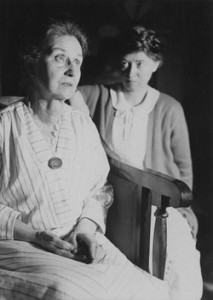 A review recently published in the New Criterion by Bruce Bawer of a new Marianne Moore biography caught my attention this week. The review begins by chastising a decades old biography penned by Charles Molesworth, a biographer Bawer accuses of stubbornly ignoring the peculiar social environments in which Moore lived for the majority. These environments were, according to Leavall, forged by the psychological illnesses of Moore’s mother and father; father John Moore, described as a shopworn ruffian, is simply labeled “a full-blown psychotic,” while mother Mary is presumed to be driven insane by her irreconcilable Christian principles and open lesbianism.
A review recently published in the New Criterion by Bruce Bawer of a new Marianne Moore biography caught my attention this week. The review begins by chastising a decades old biography penned by Charles Molesworth, a biographer Bawer accuses of stubbornly ignoring the peculiar social environments in which Moore lived for the majority. These environments were, according to Leavall, forged by the psychological illnesses of Moore’s mother and father; father John Moore, described as a shopworn ruffian, is simply labeled “a full-blown psychotic,” while mother Mary is presumed to be driven insane by her irreconcilable Christian principles and open lesbianism.
Following Mary’s separation from her husband resulting from to his worsening “religious mania,” the single mother of two adopted strange codes of conduct, which she stringently imposed on her children. According to the review, Leavall unearths disturbing minutiae from Moore’s home-life: a unique “language” spoken by the family and Mary’s partner (who began living with the Moores when Marianne was thirteen), brother Warner’s virtual exile after marrying, Mary’s insistence of implementing male pronouns when referring to Marianne.
And then a prognosis is conjectured from these one-dimensional facts—one which creates a hypothesis that, though bombastically sure of itself, constructs a fascinating lens with which to observe Moore’s poetry. To “escape” the imprisoning world by which Mary fettered her daughter to her side, the Leavall argues and Bawer concurs, Marianne turned to poetry. Her verse is characterized as perseverating and obsessive, as driven by a paradoxical coherent madness. Despite the pathos of her poetry, Moore witnessed herself decline in popularity before her death in the early 70s as confessional poetry and feminist theory overtook the “‘ archetyp[al] quaint literary spinster’” character, an image to which Moore was seen, until recently, to have subscribed.
Based on Bawer’s review, Leavall’s work provides an interesting look into the life of Moore and the strange formative environment in which she was raised. However, I am nonetheless wary of the conjecture strung together from these biographical “facts,” despite its undeniable appeal. Perhaps the biography in full boasts more convincing details; published this winter by FSG, Holding On Upside Down: The Life and Work of Marianne Moore is but a quick 480-page read.
Some more reviews:

